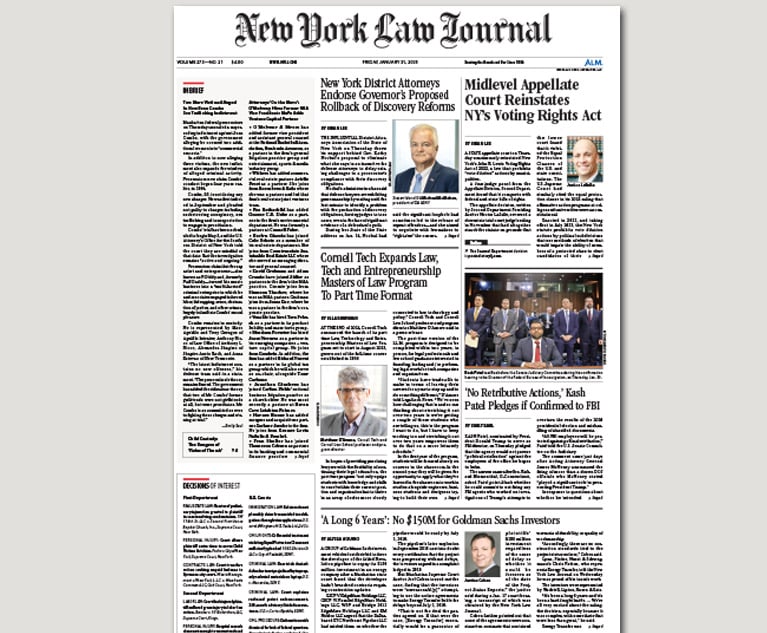2020 Federal Tax and Gift Planning, Part 2
Part 2 addresses additional planning techniques and considerations, such as the selection of assets to gift, the use of a grantor trust and/or self-settled trust, state estate and gift tax law provisions and other potential changes to federal law to be considered by taxpayers in 2020.
October 15, 2020 at 01:46 PM
8 minute read
 In Part 1 of this two-part series, we addressed the current federal gift and estate tax law provisions, the risk for legislative change to those provisions and certain planning opportunities that may be significantly less advantageous in 2021 to make gifts using a "dynasty" trust, a "SLAT," or an LLC structure and was published in the previous issue. Part 2 addresses additional planning techniques and considerations, such as the selection of assets to gift, the use of a grantor trust and/or self-settled trust, state estate and gift tax law provisions and other potential changes to federal law to be considered by taxpayers in 2020.
In Part 1 of this two-part series, we addressed the current federal gift and estate tax law provisions, the risk for legislative change to those provisions and certain planning opportunities that may be significantly less advantageous in 2021 to make gifts using a "dynasty" trust, a "SLAT," or an LLC structure and was published in the previous issue. Part 2 addresses additional planning techniques and considerations, such as the selection of assets to gift, the use of a grantor trust and/or self-settled trust, state estate and gift tax law provisions and other potential changes to federal law to be considered by taxpayers in 2020.
Selection of Appropriate Assets to Gift. In general, donees receive the same basis—known as carry-over basis—in gifted assets as the donor had in them (whether the gift is made in trust or outright). As a result, in the event that the donee then sells the gifted asset, the donee will pay tax on any capital gain in the asset just as the donor would have had to do. Alternatively, assets owned at death receive an adjustment in basis to make it equal to the fair market value of the asset on date of death. This permits the beneficiary of an estate to sell the bequeathed asset without recognition of gain in the value of the asset that occurred prior to the decedent's death. This difference in treatment of an asset's basis requires that basis should be taken into account in selecting which assets to gift—although part of the calculus should be the possibility of future law change (one of many in additional proposed changes—see below) that would apply carry-over basis to inherited assets. To minimize capital gain tax, gifts should be made of high tax basis assets and low basis assets should be retained by the donor so that the appreciation in these assets would under current law escape capital gain taxation following the donor's death. In addition, assets that are likely to appreciate in value are often the best candidates for gifting so that the future value appreciation is not subject to gift or estate tax in the donor's estate.
Use of Grantor Trust. Almost every trust created during the grantor's life for estate planning purposes can be structured as a "grantor trust" for income tax purposes which enhances the gift and estate tax advantages of the trust. A grantor trust treats the grantor as the owner of the assets of the trust for income tax purposes, but not for gift and estate tax purposes. As a result, the grantor is required to personally pay the income tax attributable to trust income—without having to treat such tax payments as additional gifts. Grantor trust status also permits the grantor to buy and sell assets from or to the trust without recognition of capital gain on the transaction. This flexibility can be useful to permit gifts of low basis assets to a grantor trust with the intention that the grantor will be able to reacquire them prior to death so that, under current law, their basis may be stepped up to fair market value at the grantor's death. A caveat, however, is to take into account in the calculus that changes to the grantor trust rules have been proposed that might restrict their advantageous treatment for future income tax years—for example, to restrict or eliminate the long-term ability for the grantor to buy low basis assets gifted to trusts in 2020 without capital gain recognition in a future tax year.
This content has been archived. It is available through our partners, LexisNexis® and Bloomberg Law.
To view this content, please continue to their sites.
Not a Lexis Subscriber?
Subscribe Now
Not a Bloomberg Law Subscriber?
Subscribe Now
NOT FOR REPRINT
© 2025 ALM Global, LLC, All Rights Reserved. Request academic re-use from www.copyright.com. All other uses, submit a request to [email protected]. For more information visit Asset & Logo Licensing.
You Might Like
View All
Law Firms Expand Scope of Immigration Expertise Amid Blitz of Trump Orders
6 minute read

Orrick Hires Longtime Weil Partner as New Head of Antitrust Litigation
Law Firms Mentioned
Trending Stories
- 1Uber Files RICO Suit Against Plaintiff-Side Firms Alleging Fraudulent Injury Claims
- 2The Law Firm Disrupted: Scrutinizing the Elephant More Than the Mouse
- 3Inherent Diminished Value Damages Unavailable to 3rd-Party Claimants, Court Says
- 4Pa. Defense Firm Sued by Client Over Ex-Eagles Player's $43.5M Med Mal Win
- 5Losses Mount at Morris Manning, but Departing Ex-Chair Stays Bullish About His Old Firm's Future
Who Got The Work
J. Brugh Lower of Gibbons has entered an appearance for industrial equipment supplier Devco Corporation in a pending trademark infringement lawsuit. The suit, accusing the defendant of selling knock-off Graco products, was filed Dec. 18 in New Jersey District Court by Rivkin Radler on behalf of Graco Inc. and Graco Minnesota. The case, assigned to U.S. District Judge Zahid N. Quraishi, is 3:24-cv-11294, Graco Inc. et al v. Devco Corporation.
Who Got The Work
Rebecca Maller-Stein and Kent A. Yalowitz of Arnold & Porter Kaye Scholer have entered their appearances for Hanaco Venture Capital and its executives, Lior Prosor and David Frankel, in a pending securities lawsuit. The action, filed on Dec. 24 in New York Southern District Court by Zell, Aron & Co. on behalf of Goldeneye Advisors, accuses the defendants of negligently and fraudulently managing the plaintiff's $1 million investment. The case, assigned to U.S. District Judge Vernon S. Broderick, is 1:24-cv-09918, Goldeneye Advisors, LLC v. Hanaco Venture Capital, Ltd. et al.
Who Got The Work
Attorneys from A&O Shearman has stepped in as defense counsel for Toronto-Dominion Bank and other defendants in a pending securities class action. The suit, filed Dec. 11 in New York Southern District Court by Bleichmar Fonti & Auld, accuses the defendants of concealing the bank's 'pervasive' deficiencies in regards to its compliance with the Bank Secrecy Act and the quality of its anti-money laundering controls. The case, assigned to U.S. District Judge Arun Subramanian, is 1:24-cv-09445, Gonzalez v. The Toronto-Dominion Bank et al.
Who Got The Work
Crown Castle International, a Pennsylvania company providing shared communications infrastructure, has turned to Luke D. Wolf of Gordon Rees Scully Mansukhani to fend off a pending breach-of-contract lawsuit. The court action, filed Nov. 25 in Michigan Eastern District Court by Hooper Hathaway PC on behalf of The Town Residences LLC, accuses Crown Castle of failing to transfer approximately $30,000 in utility payments from T-Mobile in breach of a roof-top lease and assignment agreement. The case, assigned to U.S. District Judge Susan K. Declercq, is 2:24-cv-13131, The Town Residences LLC v. T-Mobile US, Inc. et al.
Who Got The Work
Wilfred P. Coronato and Daniel M. Schwartz of McCarter & English have stepped in as defense counsel to Electrolux Home Products Inc. in a pending product liability lawsuit. The court action, filed Nov. 26 in New York Eastern District Court by Poulos Lopiccolo PC and Nagel Rice LLP on behalf of David Stern, alleges that the defendant's refrigerators’ drawers and shelving repeatedly break and fall apart within months after purchase. The case, assigned to U.S. District Judge Joan M. Azrack, is 2:24-cv-08204, Stern v. Electrolux Home Products, Inc.
Featured Firms
Law Offices of Gary Martin Hays & Associates, P.C.
(470) 294-1674
Law Offices of Mark E. Salomone
(857) 444-6468
Smith & Hassler
(713) 739-1250







